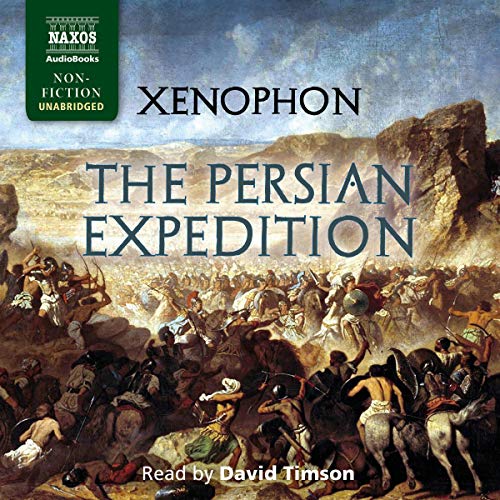
You're getting a free audiobook.
You're getting a free audiobook.

The March of the Ten Thousand
Best Sellers
-
-
The March of the Ten Thousand
- By: Xenophon
- Narrated by: Charlton Griffin
- Length: 7 hrs and 32 mins
- Unabridged
-
Overall4.5 out of 5 stars 803
-
Performance4.5 out of 5 stars 561
-
Story4.5 out of 5 stars 565
The March of the Ten Thousand is one of the most admired and widely read pieces of ancient literature...
-
5 out of 5 stars
-
One of the great adventures in human history
- By Darwin8u on 02-27-13
-
The March of the Ten Thousand
- Narrated by: Charlton Griffin
- Length: 7 hrs and 32 mins
- Release date: 07-11-03
- Language: English
Failed to add items
Sorry, we are unable to add the item because your shopping cart is already at capacity.Add to Cart failed.
Please try again laterAdd to Wish List failed.
Please try again laterRemove from wishlist failed.
Please try again laterAdding to library failed
Please try againFollow podcast failed
Please try againUnfollow podcast failed
Please try againRegular price: $19.95 or 1 credit
Sale price: $19.95 or 1 credit
-
-
-
The Persian Expedition
- By: Xenophon
- Narrated by: Pat Bottino
- Length: 10 hrs and 5 mins
- Unabridged
-
Overall4 out of 5 stars 57
-
Performance3.5 out of 5 stars 42
-
Story4.5 out of 5 stars 43
Xenophon, after being exiled from Athens, spent the last years of his life hunting, writing, and recalling in his books the great days of the Persian expedition....
-
3 out of 5 stars
-
did Stephen Hawking narrate this?
- By Jack on 09-27-16
-
The Persian Expedition
- Narrated by: Pat Bottino
- Length: 10 hrs and 5 mins
- Release date: 04-07-08
- Language: English
Failed to add items
Sorry, we are unable to add the item because your shopping cart is already at capacity.Add to Cart failed.
Please try again laterAdd to Wish List failed.
Please try again laterRemove from wishlist failed.
Please try again laterAdding to library failed
Please try againFollow podcast failed
Please try againUnfollow podcast failed
Please try againRegular price: $15.56 or 1 credit
Sale price: $15.56 or 1 credit
-
-
-
Hellenica
- By: Xenophon
- Narrated by: Charlton Griffin
- Length: 10 hrs and 59 mins
- Unabridged
-
Overall5 out of 5 stars 82
-
Performance5 out of 5 stars 76
-
Story4.5 out of 5 stars 74
The Hellenica is Xenophon’s continuation of Thucydides’ history of the Peloponnesian War, literally resuming from where the previous author’s history was abruptly left unfinished and narrating the events of the final seven years of the conflict and the war’s aftermath....
-
5 out of 5 stars
-
A read no history lover should do without!
- By Epaminondas on 11-07-19
-
Hellenica
- Narrated by: Charlton Griffin
- Length: 10 hrs and 59 mins
- Release date: 01-29-19
- Language: English
Failed to add items
Sorry, we are unable to add the item because your shopping cart is already at capacity.Add to Cart failed.
Please try again laterAdd to Wish List failed.
Please try again laterRemove from wishlist failed.
Please try again laterAdding to library failed
Please try againFollow podcast failed
Please try againUnfollow podcast failed
Please try againRegular price: $24.95 or 1 credit
Sale price: $24.95 or 1 credit
-
-
-
The Persian Expedition
- The March of the Ten Thousand, or Anabasis
- By: Xenophon
- Narrated by: David Timson
- Length: 9 hrs and 15 mins
- Unabridged
-
Overall5 out of 5 stars 85
-
Performance5 out of 5 stars 71
-
Story5 out of 5 stars 71
Seeking to depose his brother Artaxerxes and take his place upon the Persian throne, Cyrus the Younger leads the 10,000 mercenaries on a dangerous campaign deep into the heart of Persia....
-
5 out of 5 stars
-
classic story, classic narrator
- By snozek on 07-26-20
-
The Persian Expedition
- The March of the Ten Thousand, or Anabasis
- Narrated by: David Timson
- Length: 9 hrs and 15 mins
- Release date: 03-13-20
- Language: English
Failed to add items
Sorry, we are unable to add the item because your shopping cart is already at capacity.Add to Cart failed.
Please try again laterAdd to Wish List failed.
Please try again laterRemove from wishlist failed.
Please try again laterAdding to library failed
Please try againFollow podcast failed
Please try againUnfollow podcast failed
Please try againRegular price: $21.06 or 1 credit
Sale price: $21.06 or 1 credit
-
-
-
The Memorable Thoughts of Socrates
- By: Xenophon, Edward Bysshe - translator
- Narrated by: Nicholas Tecosky
- Length: 6 hrs and 27 mins
- Unabridged
-
Overall4 out of 5 stars 74
-
Performance4 out of 5 stars 61
-
Story4.5 out of 5 stars 63
Xenophon was a Greek who admired and studied with Socrates....
-
5 out of 5 stars
-
Philosopher, Soldier, Historian and Mercenary
- By Darwin8u on 12-04-12
-
The Memorable Thoughts of Socrates
- Narrated by: Nicholas Tecosky
- Length: 6 hrs and 27 mins
- Release date: 02-06-12
- Language: English
Failed to add items
Sorry, we are unable to add the item because your shopping cart is already at capacity.Add to Cart failed.
Please try again laterAdd to Wish List failed.
Please try again laterRemove from wishlist failed.
Please try again laterAdding to library failed
Please try againFollow podcast failed
Please try againUnfollow podcast failed
Please try againRegular price: $19.95 or 1 credit
Sale price: $19.95 or 1 credit
Included in Plus membership -
-
-
Xenophon's Cyrus the Great
- The Arts of Leadership and War
- By: Larry Hedrick
- Narrated by: Rory Barnett
- Length: 6 hrs and 31 mins
- Unabridged
-
Overall4.5 out of 5 stars 158
-
Performance4.5 out of 5 stars 135
-
Story4.5 out of 5 stars 136
A new generation of listeners, including business executives and managers, military officers, and government officials, can now learn about and benefit from Cyrus the Great's extraordinary achievements, which exceeded all other leaders' throughout antiquity....
-
1 out of 5 stars
-
Abridged
- By Bar282 on 10-02-19
-
Xenophon's Cyrus the Great
- The Arts of Leadership and War
- Narrated by: Rory Barnett
- Length: 6 hrs and 31 mins
- Release date: 04-24-18
- Language: English
Failed to add items
Sorry, we are unable to add the item because your shopping cart is already at capacity.Add to Cart failed.
Please try again laterAdd to Wish List failed.
Please try again laterRemove from wishlist failed.
Please try again laterAdding to library failed
Please try againFollow podcast failed
Please try againUnfollow podcast failed
Please try againRegular price: $17.19 or 1 credit
Sale price: $17.19 or 1 credit
-
-
-
On Horsemanship
- By: Xenophon
- Narrated by: Holly Brienne
- Length: 55 mins
- Unabridged
-
Overall4.5 out of 5 stars 23
-
Performance5 out of 5 stars 18
-
Story4.5 out of 5 stars 18
On Horsemanship, also sometimes titled The Art of Horsemanship, is a treatise written about 350 BCE by the Athenian historian, soldier, and student of Socrates, Xenophon (c. 430-354 BC). The treatise is a "hands-on" manual which deals with the selection....
-
4 out of 5 stars
-
classic treatise on mideaval equestrian training
- By Amazon Customer on 05-19-21
-
On Horsemanship
- Narrated by: Holly Brienne
- Length: 55 mins
- Release date: 10-07-19
- Language: English
Failed to add items
Sorry, we are unable to add the item because your shopping cart is already at capacity.Add to Cart failed.
Please try again laterAdd to Wish List failed.
Please try again laterRemove from wishlist failed.
Please try again laterAdding to library failed
Please try againFollow podcast failed
Please try againUnfollow podcast failed
Please try againRegular price: $9.09 or 1 credit
Sale price: $9.09 or 1 credit
-
-
-
The March of the Ten Thousand
- By: Xenophon
- Narrated by: Alastair Cameron
- Length: 7 hrs and 54 mins
- Unabridged
-
Overall5 out of 5 stars 15
-
Performance5 out of 5 stars 15
-
Story5 out of 5 stars 15
The March of the Ten Thousand by Xenophon is an account of the Greek mercenary armies formed by Cyrus the Younger in an attempt to overthrow his brother, Artaxerxes II, with the purpose of gaining control of the Persian Empire....
-
The March of the Ten Thousand
- Narrated by: Alastair Cameron
- Length: 7 hrs and 54 mins
- Release date: 08-15-18
- Language: English
Failed to add items
Sorry, we are unable to add the item because your shopping cart is already at capacity.Add to Cart failed.
Please try again laterAdd to Wish List failed.
Please try again laterRemove from wishlist failed.
Please try again laterAdding to library failed
Please try againFollow podcast failed
Please try againUnfollow podcast failed
Please try againRegular price: $19.95 or 1 credit
Sale price: $19.95 or 1 credit
-
-
-
The Art of Horsemanship
- By: Xenophon
- Narrated by: Busy Kislig-Shires Byerly
- Length: 1 hr and 57 mins
- Unabridged
-
Overall4 out of 5 stars 1
-
Performance4 out of 5 stars 1
-
Story4 out of 5 stars 1
Among the earliest known works on choosing, caring for, and riding horses, this book is still hailed--2,300 years after it was written - as one of the most complete, thoughtful, and accessible guides of its type.
-
The Art of Horsemanship
- Narrated by: Busy Kislig-Shires Byerly
- Length: 1 hr and 57 mins
- Release date: 08-22-24
- Language: English
Failed to add items
Sorry, we are unable to add the item because your shopping cart is already at capacity.Add to Cart failed.
Please try again laterAdd to Wish List failed.
Please try again laterRemove from wishlist failed.
Please try again laterAdding to library failed
Please try againFollow podcast failed
Please try againUnfollow podcast failed
Please try againRegular price: $6.95 or 1 credit
Sale price: $6.95 or 1 credit
-
-
-
The Art of Horsemanship and on the Cavalry General by Xenophon
- By: Morris Morgan - translator, Xenophon
- Narrated by: David Rintoul
- Length: 2 hrs and 45 mins
- Unabridged
-
Overall5 out of 5 stars 1
-
Performance5 out of 5 stars 1
-
Story5 out of 5 stars 1
Xenophon's The Art of Horsemanship is a highly unusual text in the corpus of Classical Greek literature. It is a short survey on the various aspects of care for horses as seen by a highly experienced rider from the 5th century BCE....
-
The Art of Horsemanship and on the Cavalry General by Xenophon
- Narrated by: David Rintoul
- Length: 2 hrs and 45 mins
- Release date: 11-30-23
- Language: English
Failed to add items
Sorry, we are unable to add the item because your shopping cart is already at capacity.Add to Cart failed.
Please try again laterAdd to Wish List failed.
Please try again laterRemove from wishlist failed.
Please try again laterAdding to library failed
Please try againFollow podcast failed
Please try againUnfollow podcast failed
Please try againRegular price: $7.41 or 1 credit
Sale price: $7.41 or 1 credit
-
-
-
Xenophon Box Set
- On Horsemanship & Hiero, or "The Tyrant"
- By: Xenophon
- Narrated by: Museum Audiobooks cast
- Length: 2 hrs and 9 mins
- Unabridged
-
Overall0 out of 5 stars 0
-
Performance0 out of 5 stars 0
-
Story0 out of 5 stars 0
Xenophon of Athens (c. 430 BC - 354 BC) was an Athenian historian, philosopher, and soldier. "Hiero", one of Xenophon’s minor works, is a dialogue between Hiero, tyrant of Syracuse, and the lyric poet Simonides....
-
Xenophon Box Set
- On Horsemanship & Hiero, or "The Tyrant"
- Narrated by: Museum Audiobooks cast
- Length: 2 hrs and 9 mins
- Release date: 12-16-20
- Language: English
Failed to add items
Sorry, we are unable to add the item because your shopping cart is already at capacity.Add to Cart failed.
Please try again laterAdd to Wish List failed.
Please try again laterRemove from wishlist failed.
Please try again laterAdding to library failed
Please try againFollow podcast failed
Please try againUnfollow podcast failed
Please try againRegular price: $10.49 or 1 credit
Sale price: $10.49 or 1 credit
-
-
-
Hiero, or "The Tyrant"
- By: Xenophon
- Narrated by: Lambrini Lamprou
- Length: 1 hr and 14 mins
- Unabridged
-
Overall5 out of 5 stars 2
-
Performance4.5 out of 5 stars 2
-
Story5 out of 5 stars 2
Xenophon was an ancient Greek philosopher, historian, soldier, and student of Socrates. In the dialogue between the poet Simonides and Hiero, tyrant of Syracuse, Xenophon discusses the burdens of being an absolute dictator and the superior happiness of the private individual....
-
Hiero, or "The Tyrant"
- Narrated by: Lambrini Lamprou
- Length: 1 hr and 14 mins
- Release date: 03-04-19
- Language: English
Failed to add items
Sorry, we are unable to add the item because your shopping cart is already at capacity.Add to Cart failed.
Please try again laterAdd to Wish List failed.
Please try again laterRemove from wishlist failed.
Please try again laterAdding to library failed
Please try againFollow podcast failed
Please try againUnfollow podcast failed
Please try againRegular price: $9.95 or 1 credit
Sale price: $9.95 or 1 credit
-


















